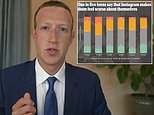Whistleblower behind damning ‘Facebook Files’ will reveal identity and testify before Congress
Whistleblower behind damning ‘Facebook Files’ that revealed social media giant knew Instagram was toxic, will reveal their identity and testify before Congress before the end of the year
The whistleblower who leaked internal files from Facebook will testify before the Senate Commerce Committee Consumer protection panelThey plan to reveal their identity before the end of the yearThe files detailed how Facebook knew about Instagram’s effect on the mental health of teen girls but continued to create beauty-filter toolsThe tools were cited as one of the reasons girls felt depressed and suicidalFacebook will send its global head of safety to also testify before the committee
<!–
<!–
<!–<!–
<!–
(function (src, d, tag){
var s = d.createElement(tag), prev = d.getElementsByTagName(tag)[0];
s.src = src;
prev.parentNode.insertBefore(s, prev);
}(“https://www.dailymail.co.uk/static/gunther/1.17.0/async_bundle–.js”, document, “script”));
<!–
DM.loadCSS(“https://www.dailymail.co.uk/static/gunther/gunther-2159/video_bundle–.css”);
<!–
The whistleblower who leaked the notorious ‘Facebook Files’ which revealed that the social media giant knew Instagram could be toxic to teenage girls, will reveal their identity and testify Congress before the end of 2020.
A source familiar with the matter said the whistleblower has agreed to work with Congress and plans to appear before the Senate Commerce Committee Consumer protection panel to discuss Facebook’s flaws, Fox Business reports.
Facebook, which has long had to answer to Congress on how its platform is used, came under scrutiny once again when the leaked files detailed that Facebook knew Instagram was harmful to teenaged girls and still continued to rollout additions to the app that propagated the harm.
The social media giant confirmed that Antigone Davis, its global head of safety, would also testify before the Senate committee.
Facebook CEO Mark Zuckerberg testified before a senate committee last November on the companies practices. The social media giant continues to be scrutinized by Congress
This is some of the research Facebook was shown about how Instagram is harming teens
According to the documents given to the Wall Street Journal, Facebook had known for two years now that Instagram is toxic for young girls but continued to add beauty-editing filters to the app, despite six per cent of suicidal girls in America blaming it for their desire to kill themselves.
When Facebook researches first alerted the company of the issue in 2019, they said: ‘We make body image issues worse for one in three teen girls.’
‘Teens blame Instagram for increases in the rate of anxiety and depression. This reaction was unprompted and consistent across all groups.’
One message posted on an internal message board in March 2020 said the app revealed that 32 per cent of girls said Instagram made them feel worse about their bodies if they were already having insecurities.
About one in five said the app made them feel worse about themselves.
CEO Mark Zuckerberg has been quiet in the past about the issues the app is blamed for causing among young girls.
He told Congress in March 2021 that Instagram has ‘positive mental-health benefits’.
Instagram has a ‘parental guide’ which teaches parents how to monitor their kids’ accounts by enabling features like screen time limits and who can comment on posts, but there’s no way to verify someone’s age before they join the site.
Instagram claims it only accepts users aged 13 and over but says many lie about it when they join.
Forty percent of Instagram’s 1 billion monthly users are under the age of 22 and just over half are female.
Instagram also does not flag any photograph or image that may have been distorted or manipulated, despite flagging materials it deems to contain misinformation, political posts or paid advertising.
Sen. Richard Blumenthal criticized Facebook’s actions and will serve on the Senate committee examining what Facebook knew and how it’s services affect young people
Sen. Richard Blumenthal, who sits on the Senate committee, told the Journal that Facebook’s answers were vague which raised questions that it was deliberately hiding the research.
‘Facebook’s answers were so evasive – failing to respond to all our questions – that they really raise questions about what Facebook might be hiding.
‘Facebook seems to be taking a page from the textbook of Big Tobacco – targeting teens with potentially dangerous products while masking the science in public.’
In the letter, the company also said it kept the research ‘confidential to promote frank and open dialogue and brainstorming internally.’
Blumenthal added that the committee will also meet with representatives from YouTube and Snapchat to testify about their products affect kids as Congress moves to rein in and understand social medias growing influence among children, the Washington Post reported.
![]()


